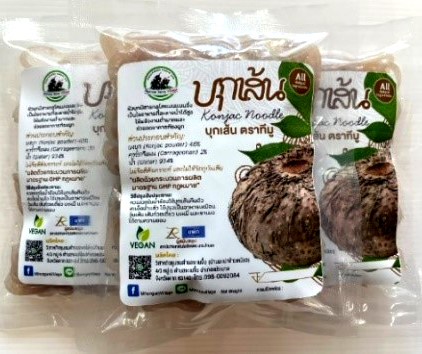Value Added Creation and Raising the Konjac Products Standard Quality of Ban Moang Wa, Khane Chue District, Tak Province, Thailand
Main Article Content
Abstract
In Ban Maung Wa, Khanechue sub-district, Mae Ramat district, Tak Province, a community of farmers is dedicated to cultivating konjac, selling fresh tubers to processing factories. Their goal is to produce high-quality konjac powder without using chemical substances, thereby enhancing its value and quality. This initiative involves the production and processing sectors, knowledge development, improving agricultural product value, and fostering community sustainability. The research primarily focused on empowering the community through learning, innovative adaptation, problem-solving, and implementing the following steps: 1) Conducting community meetings and discussions with stakeholders, 2) Enhancing knowledge to boost agricultural product value and elevate community innovation (improving konjac processing, developing a powder production facility, and refining packaging and branding), 3) Developing packaging and branding to instill consumer confidence, and 4) Establishing a network of community researchers and innovators to expand knowledge. The result was the successful transformation of fresh konjac tubers into high-quality noodles and pumpkin konjac noodles under the Teemu brand. This enhancement substantially increased the selling price of fresh konjac tubers by 2 to 50 times, leading to a significant income boost for the Ban Maung Wa community. Additionally, the community improved a solar drying house for konjac processing and established a standard clean food production factory for konjac powder, enabling its use as raw material for food processing. This collaborative effort involved integrating the Ban Maung Wa community with the school network. Four konjac production and processing experts acted as trainers at the Production and Processing Learning Center for Konjac and Agricultural Products in Khanechue district. Their role was pivotal in disseminating knowledge and innovative technology, contributing significantly to community development.
Article Details

This work is licensed under a Creative Commons Attribution-NonCommercial-NoDerivatives 4.0 International License.
Area Based Development Research Journal values copyright protection and licensing to safeguard author rights and facilitate the appropriate dissemination of research. Our policies ensure openness, accessibility, and attribution. Authors retain copyright ownership, and articles are published under a Creative Commons Attribution License (CC BY), allowing sharing, adaptation, and proper attribution. Authors have the freedom to publish under the CC BY license, granting broad reuse and distribution permissions. The journal supports posting articles on third-party repositories, adhering to institutional and funding restrictions. Author guidelines detail copyright and licensing requirements, empowering authors with knowledge about their rights and responsibilities. These policies cultivate an environment of collaboration, openness, and responsible sharing, benefiting authors and the research community while honoring intellectual property rights.
References
Borompichaichartkul, C., Impaprasert, R., Mekkeradchoo, O., Jiamjariyatam, R., & Tripheth., P. (2016). Guidelines for utilizing konjac: Recommendations for standardized and safe production. The Office of Agricultural Research Development (Public Organization), Thailand. (in Thai).
Cham, S., & Srisamatthakarn, P. (2018). Development of extraction method of konjac powder from amorphophallus konjac (Amorphophallus oncophyllus.) by mechanical particles technique. Journal Agricultural Science, 49(1), 605-608. (in Thai).
Department of Agriculture and Cooperatives, Tak Province Office. (2017). Basic agricultural and cooperative information for Tak province. Office of the Permanent Secretary, Ministry of Agriculture and Cooperatives, Thailand. (in Thai).
Faridah, A., & Widjanarko, S. B. (2013). Optimization of multilevel ethanol leaching process of porang flour (Amorphophallus muelleri) using response surface methodology. International Journal on Advanced Science Engineering Information Technology, 3(2), 74-80.
Sukumolman, T. (2009) Konjac varieties in Thailand. Chiang Mai Rice Research Center, Research and Development Office, Agricultural Research Department Region 1, Ministry of Agriculture and Cooperatives, Chiang Mai, Thailand. (in Thai).
Office of the National Economic and Social Development Council Office of the Prime Minister, (2023). Master plan under the national strategy (2023 - 2037), (Amended version). Retrieved April 5, 2023, from: http://nscr.nesdc.go.th/wp-content/uploads/2023/03/masterplan_updated2023_080363.pdf. (in Thai).
Phukasmart, U. (2013) Konjac: A herbal plant for health. Journal Food Technology, 43(4), 55-57. (in Thai).
Srisamatthakarn, P., Cham, S., Panomwan Na Ayutthaya, R., Manochai, P., & Na Nan, P. (2019). The project for the development of prototype health food products from Amorphophallus spp. for application in the food industry under the auspices of the plant genetic conservation initiative stemming. Her Royal Highness Princess Maha Chakri Sirindhorn, Siam Boromrajakumari, Rajamangala University of Technology Lanna. (in Thai).


